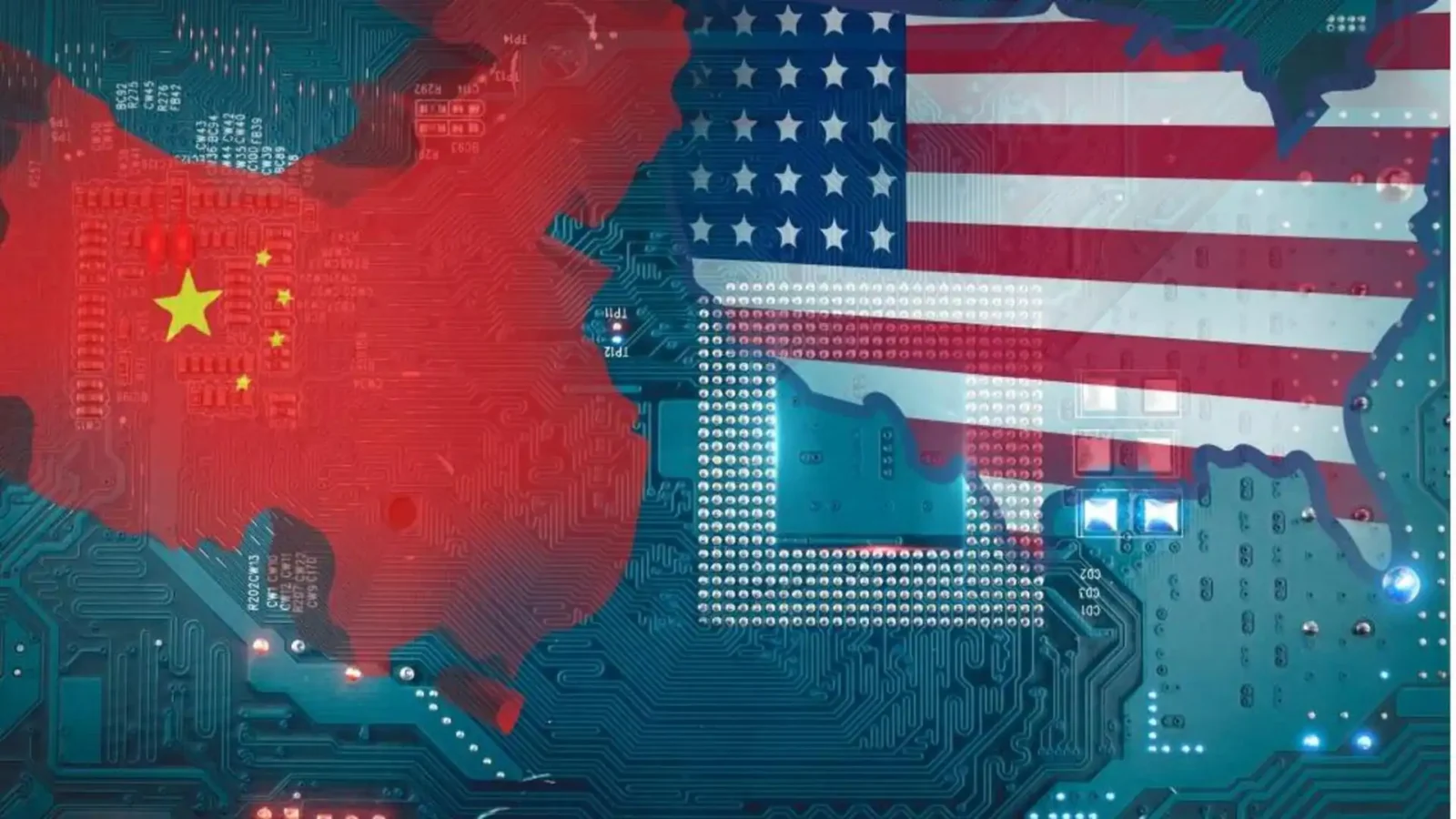The USA and China have virtually locked horns in Gulf Countries (UAE, Qatar and the Kingdom of Saudi Arabia) on their penetration through Artificial Intelligence. Both the big economies are in the race to strengthen their influence in Middle East through AI tools. The United States under the administration of President Donald Trump has geared up its endeavors to establish Artificial Intelligence (AI) data centers and research hubs both in Dubai and Saudi Arabia to keep its allied countries away from Chinese influence.
However, US lawmakers are worried about potential chip diversion to China and Russia but proponents highlight strategic advantages versus Chinese alternatives. Setting up AI data centers and research hubs is a part of the business deal done with the Kingdom of Saudi Arabia and Dubai during Trump’s visit to the Middle East in May, 2025. In response, both the UAE and Saudi Arabia will go for matching investments in the USA in building the AI infrastructure. Under the agreement with the UAE, and KSA, the US firms will own and run the computer assets in UAE and include provisions to prevent access by restricted entities like Chinese nationals or arms-listed persons.
Both The Wall Street Journal and Reuters confirm that as part of the agreement between the US and the UAE “will fund the build out of AI infrastructure in the US at least as large and powerful as that in UAE”.
It is pertinent to mention that China has also managed to make inroads in Middle East countries through AI and in the days to come, the AI war between USA and China in the gulf countries seems to intensify. A Reuters Breaking views explainer further notes the UAE’s commitment to invest heavily — more than $1.4 trillion over 10 years, including AI infrastructure in the US.
The US officials and David Sacks, US President Donald Trump’s aide on AI argue that these deals help keep Gulf AI ecosystems aligned with US tech rather than China’s. American cloud companies and hyperscalers will operate UAE compute infrastructure. They also said that the Gulf is offering land, energy, subsidies, and fast-tracked permitting resources US firms need but struggle to access domestically. “Without these overseas projects, Gulf states might partner with China anyway, shifting influence. The US-Gulf AI partnerships aim to lock in long-term American strategic and economic interests.”

The Gulf governments are pledging massive investments ($2 trillion in US), meant to balance the offshored AI compute capacity with reciprocal economic development and R&D. Building data centers in Dubai and Riyadh gives the US a strategic digital foothold in one of the world’s fastest-growing, high-potential regions. It’s a smart move for both geopolitical leverage and global business growth. Dubai is a regional logistics hub, and Riyadh is building massive digital zones like NEOM and King Salman Park. Massive investment in AI and cloud: Saudi Arabia and the UAE are investing billions of dollars into AI and cloud, digital infrastructure, creating a favorable ecosystem for data centers.
However, the leading Democrats (Warren, Schumer, Reed, and Warner) and Republicans expressed alarm over the decision of Trump’s administration. They cite risks of sensitive chips being diverted to China or Russia, eroding US tech dominance and undercutting domestic infrastructure efforts.
The Biden-era “AI diffusion” rules, which restricted export of advanced AI chips, has now been lifted, allowing hundreds of thousands of Nvidia and AMD chips to be shipped to UAE and Saudi Arabia. They also argue that despite US agreements, Gulf nations maintain strong economic and military ties with China. There’s concern that chips or AI “model weights” could be smuggled, reverse-engineered, or accessed by adversarial actors.
Some say that the Microsoft–G42 deal includes undisclosed security provisions—like “vaults within vaults” and licensing rules to block Chinese access—but critics argue they’re insufficiently transparent and potentially weak.
According to foreignpolicy.com, those who are in favour of the US-UAE and US-KSA deals argue: “If the United States turns away from willing partners like the UAE and Saudi Arabia — nations that have demonstrated a clear preference for the US stack by working with US companies and investing in US AI infrastructure — out of suspicion or through the narrow lens of the democracy-versus-autocracy framework, Washington risks creating a vacuum that China will be quick to fill. Unlike in traditional areas of geopolitical competition, where Beijing has yet to prove that it can replace the United States as a global security provider, technology is a different story. In this area, China has outpaced Western firms, building a global network that offers its stack with no strings attached. Chinese 5G hardware, renewable technologies, electric vehicles, and other mass-produced technologies have already won the global race. The choice, then, is not between trusting autocracies or preserving democratic values; it is between leading the global diffusion of US AI infrastructure or standing idle as the Chinese stack becomes the default.
However, there is no doubt that Chinese cloud companies, according to Rest of the World, a well-read publication, are quietly gaining momentum in the battle with their U.S. counterparts for the Middle East’s digital infrastructure. Amazon, Microsoft, Google, and Oracle spent years building regional tech ecosystems with data centers across the Gulf. In recent years, however, Huawei and Alibaba have outmaneuvered them by aligning more closely with local government priorities. Besides offering competitive pricing, Chinese cloud giants have entered into strategic partnerships and tailored their solutions to address specific security and sovereignty concerns.

“Chinese providers are investing in infrastructure and skills development and expanding technology partnerships, gradually gaining market traction in the cloud space,” Manish Ranjan, software and cloud research director for Europe, the Middle East, and Africa at market research company IDC, told Rest of World. “Despite the established dominance of AWS [Amazon Web Services], Azure, and Google Cloud in the Middle East, Chinese providers like Huawei and Alibaba are making a significant presence in the region.”
U.S. cloud providers established their presence in the Middle East early, with Amazon Web Services opening its first regional data center in Bahrain in 2019, followed by a data center in the United Arab Emirates in 2022. Microsoft started its first Middle Eastern cloud regions in Abu Dhabi and Dubai in June 2019, and Google Cloud entered Saudi Arabia’s Dammam region in 2023.
In Neom, a planned project set to transform the Red Sea coast of northwest Saudi Arabia into a futuristic city.
Despite this established footprint, Chinese cloud providers such as Huawei formed strong partnerships with regional telecommunications companies including STC, E& Enterprise, du, Zain, OmanTel, and Ooredoo, driving developments in cloud, artificial intelligence, 5G, and smart city technologies, Ranjan said.
“At Huawei Cloud, we are committed to enabling businesses across Saudi Arabia to thrive in the digital economy by providing world-class cloud technologies,” Alan Qi, president of Huawei Cloud, Middle East and Central Asia, said during the 2025 Mobile World Congress in Barcelona in March. “This partnership with Zain strengthens our ability to support organizations with scalable, secure, and intelligent cloud solutions.” Huawei did not respond to a request for comment from Rest of World.
Saudi Arabia is currently executing a cloud-first policy that mandates government offices to use internet-based computer services before buying their own equipment for new projects. Huawei has established four cloud facilities, including a data center in Saudi Arabia with ultralow latency capabilities, which allows information to travel between computers with almost no delay.
Last month, the company announced a partnership with telecom firm Zain KSA to upgrade its networks in Saudi Arabia. In just two years, Huawei Cloud’s Riyadh hub has onboarded more than 1,000 customers, including Saudi government agencies and major financial institutions, according to Huawei.
Similarly, Alibaba Cloud expanded strategically by opening data centers in the UAE in 2022 and Saudi Arabia last year. It entered the Saudi market by setting up a venture with STC. The Saudi Cloud Computing Company will support the kingdom’s Vision 2030 goals, under which the government hopes to diversify the economy away from oil dependency.















Leave a comment